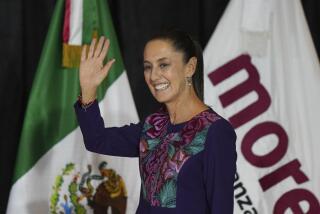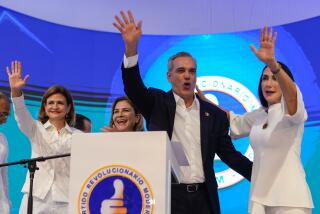Nigeria ruling party wins presidency
- Share via
LAGOS, NIGERIA — Ruling party candidate Umaru Yar Adua on Monday was declared winner of Nigeria’s presidential election amid widespread condemnation of ballot rigging, intimidation and violence, and calls to cancel the results.
The main opposition candidates rejected the result as a sham. Muhammadu Buhari, who came in second in the official vote count, called it “the most blatantly rigged election results ever produced in Nigeria.”
President Olusegun Obasanjo ruled out a rerun of Saturday’s balloting, even as observers from the European Union and U.S.-based International Republican Institute found that the election failed to meet international democratic standards.
In Washington, State Department spokesman Curtis Cooper said the election was marked by “deplorable” levels of violence and “credible reports of gross malfeasance and vote rigging.”
“An analysis of the process by most international observers does not conform with what the Nigerian national election commission has reported,” he said.
As Africa’s most populous country and a top oil producer, Nigeria sets an example for the region with its steps to democracy, analysts said.
The balloting, the first transfer of power from one civilian administration to another, was supposed to cement Nigeria’s democracy. But analysts said the optimism of 1999, when the country shrugged off decades of near-continuous military rule to embrace elections and civilian government, had faded.
Yar Adua won by a landslide, according to official results, with a total of 24.6 million votes -- more than triple that of Buhari, a former military leader with 6.6 million votes. Vice President Alhaji Atiku Abubakar, who was barred from running until the Supreme Court gave him the green light just days before the poll, received 2.6 million votes.
Speaking to state television, Yar Adua, 56, said he was humbled by his victory but had expected to win. “I did, because my party is strong and we enjoy the goodwill of the Nigerian people,” he said.
*
Chance for recourse
In a television address before the announcement of results, Obasanjo acknowledged that the election had been marred by multiple voting, ballot box theft and logistical problems. He also accused political leaders of “fanning the embers of hatred and violence.”
“I am disappointed in the conduct of the political parties and their candidates who have employed thugs and violent means to secure what they consider electoral victory,” he said.
The president added that dissatisfied parties could take legal action through election tribunals designed to resolve disputes.
Obasanjo was barred from seeking a third term by the constitution. He is scheduled to relinquish office May 29 to Yar Adua, a Muslim and former chemistry teacher who comes from an elite political family but is little known outside his home state of Katsina in the north.
Human Rights Watch spokesman Christopher Albin-Lackey said the vote was stolen in “a truly devastating blow” for Nigeria’s development as a democracy. Local observers demanded a rerun of the poll.
Albin-Lackey dismissed Obasanjo’s remarks as “disingenuous.”
“The president knows full well that to say these elections weren’t perfect is a gross understatement. The fact is they were much worse than imperfect. They were stolen,” he said in a telephone interview from the Nigerian countryside.
“Vote rigging and violence and intimidation were so widespread that it’s impossible to conclude anything but that the rights of Nigerian voters were stolen from them in the most brazen possible fashion,” Albin-Lackey said.
The European Union reported that at least 200 people had died in election violence between April 14 and 21.
The chief of the EU observer mission, Max van den Berg, said it would be damaging for the country if Nigeria’s ruling class continued to ignore the will of the people. Elections in 2003 also were condemned by international observers.
“I hope the political class, especially the ruling party, doesn’t go on as if it’s business as usual,” he said in a phone interview from Abuja, the capital. “If you really want the engagement of your people in the democratic process, you have to take them seriously and you have to respect them.”
*
Fraud allegations
Innocent Chukwuma of the Transition Monitoring Group, the main Nigerian observer group, said it would be difficult for political parties to appeal the results in election tribunals because the evidence had been hidden. There were no results sheets available in most of the polling stations where rigging took place, he said, which would make legal action difficult.
He said some of the election fraud was blatant. In Rivers state, he noted, observers reported that almost no voting took place in most areas. Yet the official turnout was put at more than 80%, the majority in favor of Yar Adua.
“That is an April Fools’ joke,” he said, adding that monitors with his group reported a turnout so low it could be described as a boycott. Another monitoring group, Stakeholder Democracy Network, also noted an extremely low turnout in the state.
Chukwuma said that like past military rulers, the ruling party would be seen as illegitimate by Nigerians.
“It means we are entering a period of uncertainty and instability because the government will not have legitimacy in the minds of the Nigerian people,” he said. “A government without legitimacy is a recipe for instability.”
Former U.S. Ambassador to Zimbabwe Tom McDonald, who recently visited Nigeria, said in a phone interview that it was better that Nigeria push forward and improve on its democracy despite serious problems.
“I think you have to keep in mind: What are the options? You either have elections or you don’t have elections,” he said. “It needs to be sorted out by the Nigerians themselves, and having elections generally is obviously better than not having elections.”
*
The Times’ Washington Bureau contributed to this report.
More to Read
Sign up for Essential California
The most important California stories and recommendations in your inbox every morning.
You may occasionally receive promotional content from the Los Angeles Times.










